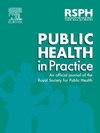An innovative Data sharing and Visualisation Tool (DAVIT) to improve domestic abuse data insight and multi-agency collaborations: An explorative study of acceptability, relevance and implementation considerations
IF 1.9
Q2 PUBLIC, ENVIRONMENTAL & OCCUPATIONAL HEALTH
引用次数: 0
Abstract
Objectives
Domestic Abuse (DA) is a public health concern impacting multiple sectors. Partnerships and coordinated responses from statutory agencies are vital to ensure DA survivors’ needs are met, but this is impeded by the accessibility of quality DA data. We present an innovative data sharing and visualisation tool (DAVIT) and its perceived potential to improve DA insight and multi-agency collaborations.
Study design
Qualitative exploratory study.
Methods
DAVIT was developed by Surrey County Council (SCC) through a consultation and prioritisation process with multi-agencies interested in DA. Focus group discussions (FGDs) were conducted on Zoom with representatives of agencies responding to DA in Surrey area to obtain their views regarding the relevance, acceptability and the potential for implementing DAVIT into practice. Qualitative data analysis was guided by the updated Consolidation Framework of Implementation Research (CFIR).
Results
Fifteen individuals representing seven agencies participated in 1-h long FGDs. Participants perceived DAVIT as well-designed, simple to use and adaptable to the local context but it needed improvements in data quality and comprehensiveness. Our findings suggest that DAVIT could enable intelligent planning and allocation of resources, delivery of targeted interventions and commissioning of DA service. Organisations' networks and connections, favourable data governance structure, policies, and regulations (outer settings); availability of resources, knowledge & information (inner settings); and individuals’ capacity, competence and support from high-level leaders will all influence the implementation of DAVIT into practice.
Conclusions
DAVIT is acceptable and if improved and successfully implemented into practice could improve DA services. Provision of minimal training to data officers in organisations will maximize the utility of DAVIT. A clear data governance structure and data sharing framework will help the implementation of DAVIT.
一个创新的数据共享和可视化工具(DAVIT),以改善家庭虐待数据洞察力和多机构合作:可接受性,相关性和实施考虑的探索性研究
目的家庭虐待是一个影响多个部门的公共卫生问题。法定机构之间的伙伴关系和协调一致的反应对于确保残障幸存者的需求得到满足至关重要,但这受到残障幸存者能否获得优质残障数据的阻碍。我们提出了一种创新的数据共享和可视化工具(DAVIT),以及它在提高数据分析洞察力和多机构合作方面的潜力。研究设计定性探索性研究。方法萨里郡议会(SCC)通过与对DA感兴趣的多机构协商和确定优先顺序的过程,制定了sdavit。焦点小组讨论(fgd)是在Zoom上与萨里地区响应数据发展的机构代表进行的,以获得他们对实施DAVIT的相关性、可接受性和潜力的看法。定性数据分析以更新的实施研究整合框架(CFIR)为指导。结果7家机构15人参加了1小时的fgd。与会者认为DAVIT设计良好,使用简单,适合当地情况,但在数据质量和全面性方面需要改进。我们的研究结果表明,DAVIT可以实现智能规划和资源分配,提供有针对性的干预措施和DA服务的调试。组织的网络和连接,有利的数据治理结构,政策和法规(外部设置);资源、知识的可获得性;信息(内部设置);个人的能力、能力和高层领导的支持都会影响DAVIT的实施。结论该方法是可接受的,如果改进并成功实施,可提高数据处理服务水平。向各机构的数据主任提供最少的培训,可最大限度地发挥DAVIT的效用。清晰的数据治理结构和数据共享框架将有助于DAVIT的实施。
本文章由计算机程序翻译,如有差异,请以英文原文为准。
求助全文
约1分钟内获得全文
求助全文

 求助内容:
求助内容: 应助结果提醒方式:
应助结果提醒方式:


